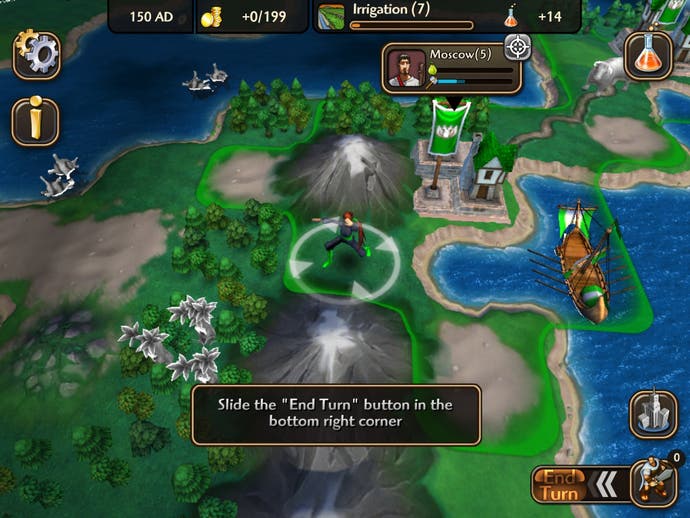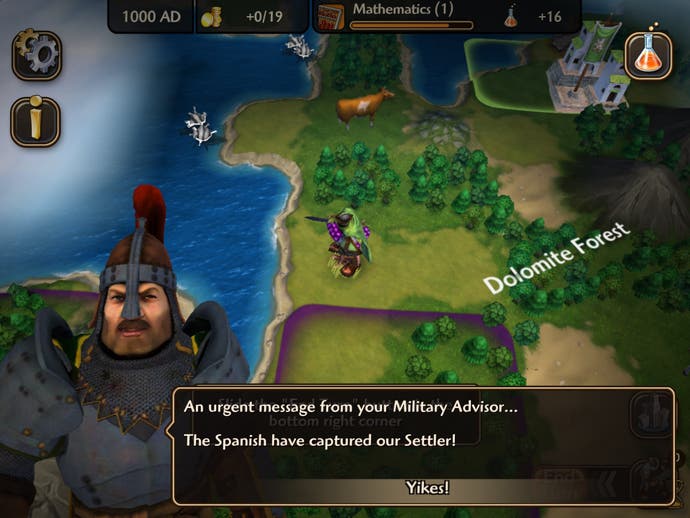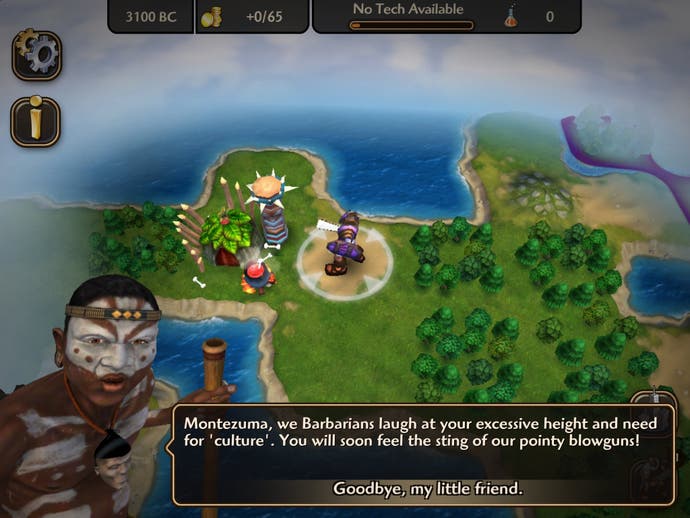Civilization Revolution 2 review
The whole world in your hands?
You're not a true strategy gamer unless one of your tank battalions has been destroyed by a Roman legion. It's practically a rite of passage as, since 1991, the Civilization series has been giving strategy gamers the world over the opportunity to lose battles against under-equipped, technically inferior opponents. Pikemen have stabbed at aeroplanes. Barbarians have battered battleships. Musketeers have shrugged off stealth bombers. While the series has introduced all sorts of checks and balances to mitigate this, I'm delighted to report that Civilization Revolution 2, its latest instalment, still allows the occasional victory using what I can only imagine are Ewok tactics. And, really, would we expect anything else?
Actually, Civilization Revolution 2 confounds expectations. Like its predecessor, it can't be doing with most of the advancements and additions the rest of the series has carefully developed over the last two decades. While its peers have gradually grown both more complex and more nuanced, it instead wants to present a leaner, sleeker alternative. A Civ-lite. A diet Civ that offers that same, great taste, but which can be completed in an afternoon instead of a long weekend. Its tech trees are subtly trimmed, its worlds are smaller, its diplomacy gets to the point.
But unlike its predecessor - beloved of so many console gamers because it gave them the opportunity to fight their friends for world domination and be in bed by nine - Civilization Revolution 2 drops the multiplayer component that was its strongest sell. Now, it's a strictly single-player experience brought to iOS devices and, in slimming itself down even further, it's starting to look just a bit too thin. Perhaps even unhealthy.

It's still a game about cultural superiority, taking the core tenet of Civilization: the challenge of building a nation from prehistory to the fringe of posthumanism while competing with rival nations in the fields of technology, culture and military might. The best nation is that which either wins a space race to Alpha Centauri, blesses the world with twenty Wonders and Great People, amasses a tremendous pile of cash or captures four rival capitals. While all victory conditions are possible, the game is most often nudging you toward the latter. From the earliest days of your civilization, you must always prepare for the ever-present threat of conflict. This is a world forever on the brink of war.
It's something that makes Civilization Revolution 2 behave much like its oldest, crankiest and most flawed ancestor, the very first Civilization. As you gradually reach outward, pushing back the fog of war that hangs over whatever earth the game has randomly generated this time, you meet rivals that are as stupid as they are aggressive, each of them with a paint-by-numbers vision of the world map that only has room for their nation's colour. Your diplomatic options are rudimentary and your opponents are far more interested in fighting you than each other, generally inclined to make their cities little more than recruiting centres and prioritising military might over the need for culture or technology.

At lower difficulty levels, their ignorance makes them an inconvenience against your ambitions, but up the challenge and they evolve into aggressive, belligerent and demanding opponents, though still never quite graduating to appreciable intelligence. They won't gang up against you. They won't bluff. The certainly won't surprise you.
Still, if your opponents do nothing else, they certainly give the game a sense of pace by always pressing at your borders, always standing by to exploit any weakness you might present. There's rarely any downtime and the impetus is always to expand or to strengthen your nation, to grow so as not to stagnate. Even this less complicated incarnation of Civilization is still a game packed with technologies, units, concepts and systems and there's almost always something to think about next. When there isn't, there are moments of elegant smoothness: moments where the game quietly shifts your units according to your advance orders, skips a few turns while nothing happens, fast-forwards you towards your next decision.
But it can also feel rather primitive, as if Civilization Revolution 2 has taken a step backward rather than the step sideways that the first Revolution took. While it's certainly a fine-looking iOS game, with a well realised 3D world, shiny presentation and a very sleek interface (though overlong battle animations outstay their welcome and some buttons are a too tiny on iPhones), it eschews the nuance that the series has so carefully developed. The more you play it, the more it appears lacking, even immature.

Great People, key resources that can give considerable boosts to your progress, are left idle by the AI, just waiting to be captured and co-opted. There's no world map in a game that encourages global conquest. Other nations forget to build roads and inevitably lag behind you in scientific advances, something that compounds their short-sightedness as you discover that researching many new technologies first grants extra bonuses like free buildings or free units. Rapid technological progress clogs the map with archaic units and it can take as long to build a new unit as it can to make it obsolete by researching something better. Both rival leaders and your own advisers whoop at you enthusiastically in a Sims-like language, gesticulating wildly in a slightly grating fashion. And then there are the barbarians.
The Civilization series has always been about conquest and expansion and imperialism. This is where it tells you that success is to be found; this is the secret to a strong civilization, a glorious nation, and it's certainly the way that many of the real world's most influential powers have profited. Still, I'm not comfortable when, as my explorers push back the frontiers of the unknown, I'm confronted with the leader of an unaffiliated wilderness settlement who's presented as a melodramatic black man covered in body paint, bleating and chirruping and shrieking as he tells me he has no interest in "culture". Suddenly, I feel like I'm watching one of those old Tom and Jerry cartoons from the 1940s, one where the black maid is a caricature, not a character. It looks archaic. I don't like it.
Not all of these settlements are represented this way. Some are shown as highlanders or Viking-like people, but they're more measured in their depiction and behaviour. The black man is the most animated. The craziest.

Civilization Revolution 2 does some things well and others poorly. Its relative simplicity within the series will deter many Civilization fans, but this same distillation will make it more palatable to players who want a quicker and pacier game. Still, its lack of multiplayer is almost an gaping wound, a glaring omission in light of its predecessor's success, and it serves only to highlight how klutzy and limited the AI can be.
At its best, the game can be challenging and it can be interesting, but it's not compelling. It's more of a distraction than the outright preoccupation that so many other Civilization games can become and, looks aside, it's no great advancement on the first Civilization Revolution. While it does give you a whole planet in your pocket, with the chance to tap your way to world domination during your daily commute, I'd suggest aiming for something better. Hold loftier ambitions.










